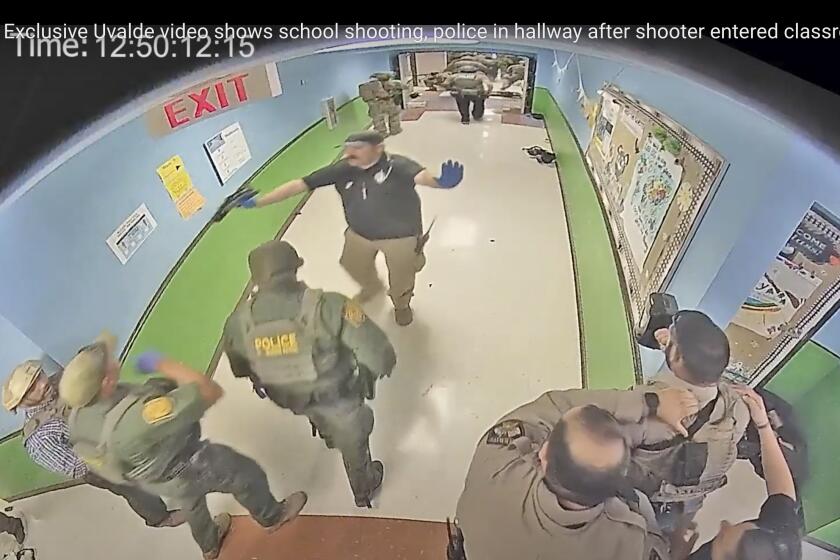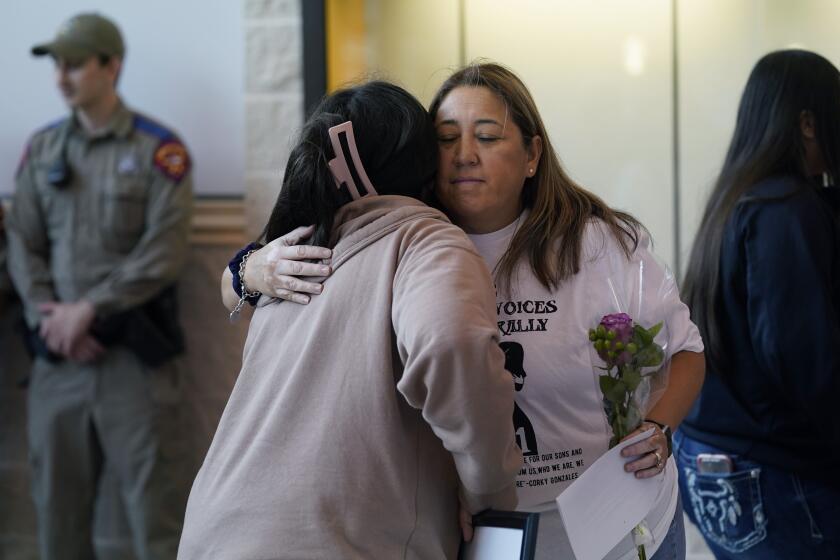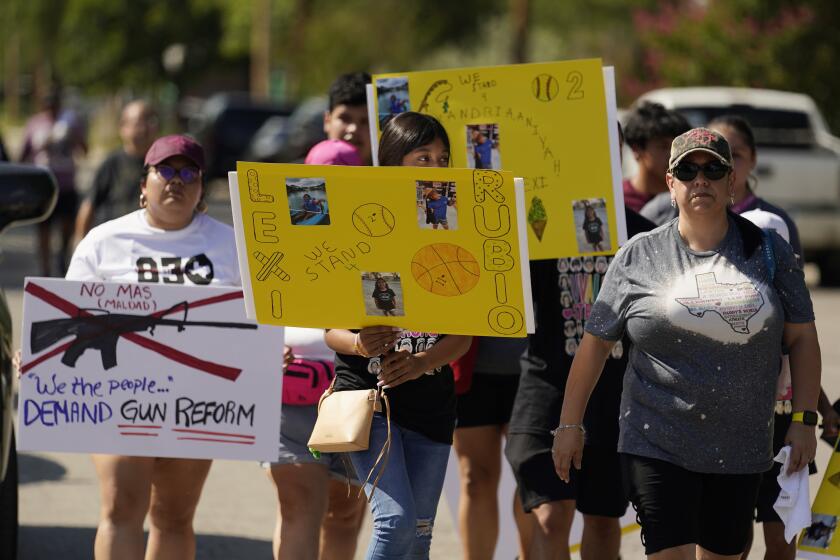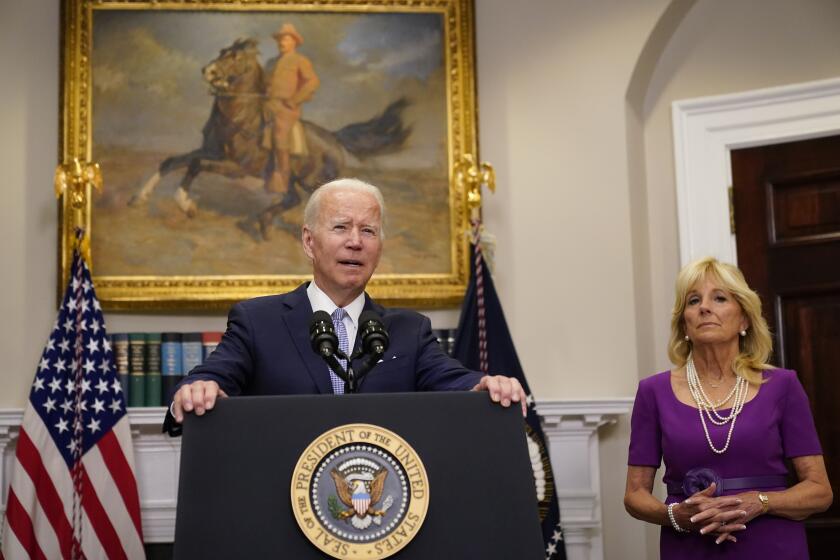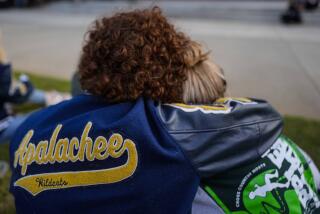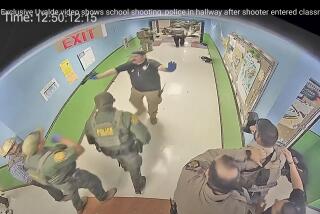Uvalde students go back to school for first time since attack
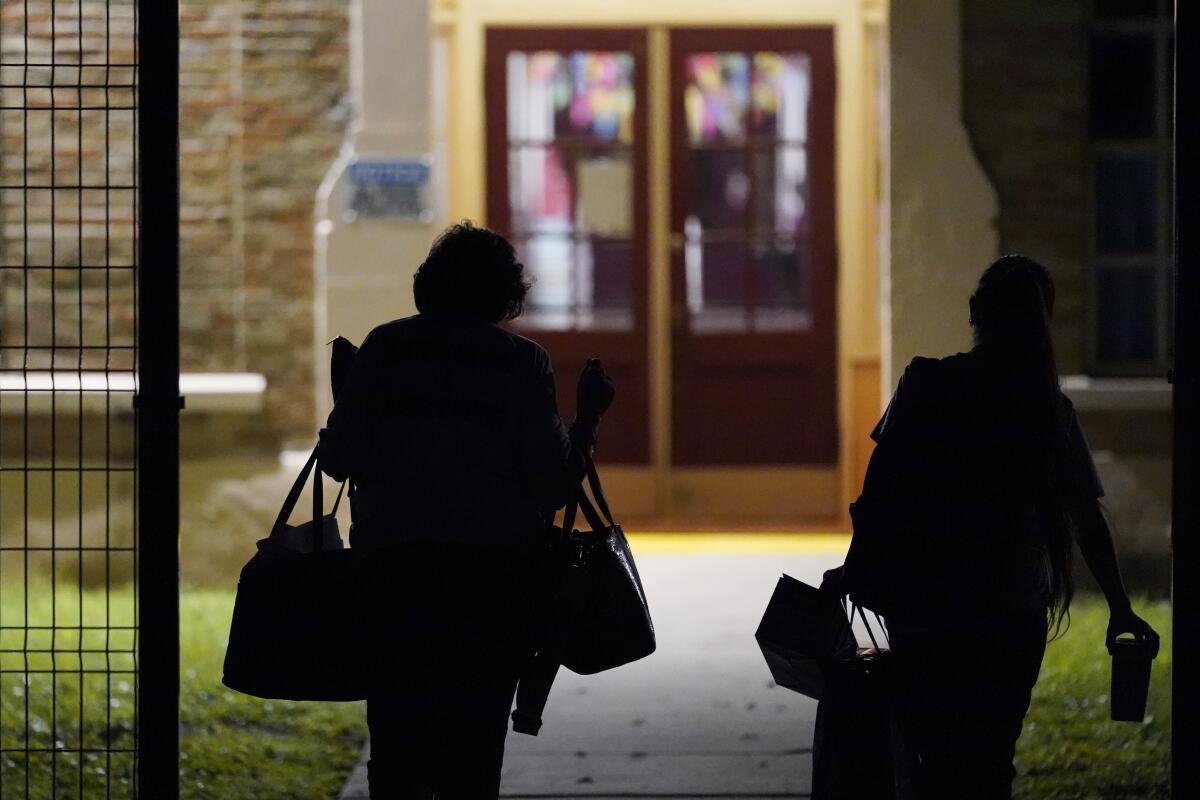
- Share via
AUSTIN, Texas — Students in Uvalde went back to school Tuesday for the first time since a gunman killed 19 children and two teachers in a classroom attack that shocked the country and helped fuel passage of a landmark national law on gun violence.
Children began arriving at Uvalde Elementary before dawn, walking through newly installed 8-foot metal fencing that surrounds the campus and past a state trooper standing guard outside an entrance.
Colorful flags hung inside the hallways, and teachers wore turquoise shirts that read “Together We Rise & Together We Are Better” on the back. State troopers were parked on every corner outside the school.
The district announced in late June that the scene of the assault, Robb Elementary, would be permanently closed and eventually torn down, though a timeline has not been set. Fundraising is underway for the construction of a new elementary school.
Ashley Morales planned to put her son, Jeremiah, back in class because she has no other choice as a working single mother. She said she would drop him off outside Uvalde Elementary because parents were not allowed inside.
“I’m just nervous, scared,” said Morales, whose son was a third-grader last year at Robb Elementary and lost three friends in the May 24 massacre. During a recent “Meet the Teacher” night, she felt a rush of anxiety walking down the school hall.
A report says nearly 400 law enforcement officials rushed to a mass shooting that left 21 people dead at an Uvalde, Texas, elementary school.
“Oh my gosh, it’s actually going to happen,” she said. “School is going to start.”
Teachers hugged students climbing out of cars in the drop-off line and guided them toward a line of teachers who were waiting behind the fence.
“Good morning, sunshine!” one teacher could be heard saying. “You ready to have a good school year?”
Celeste Ibarra, 30, had a knot in her stomach as she got her 9- and 8-year-old children ready and kissed them goodbye. She used to believe students their age should not have cellphones, but after a summer of active-shooter drills, she changed her mind.
“I was scared, just scared I won’t get them back,” Ibarra said, standing in her front yard across the street from Uvalde Elementary.
The Uvalde school district’s police chief was fired after allegations that he made key mistakes during a shooting that killed 19 students and two teachers.
School started weeks ago in many parts of Texas, but district officials pushed back the first day of class in Uvalde after a summer of heartache, anger and revelations of widespread failures by law enforcement officers who allowed an 18-year-old gunman to fire inside adjoining fourth-grade classrooms for more than 70 minutes.
Uvalde school officials said several enhanced security measures are still incomplete, including the installation of additional cameras and new locks.
The Texas Department of Public Safety has committed to putting nearly three dozen state troopers on Uvalde campuses. But that was of no comfort to some families as more than 90 state troopers were present during the attack.
For 10-year-old Gilbert Mata, who was wounded by a ricocheting bullet, the sight of many police is a “trigger,” said his mother, Corina Camacho. He’s also frightened by the smell of things burning — a reminder of the acrid odor of gun smoke.
Gilbert was nervous but wanted to go back to class Tuesday. His stepfather, however, cannot shake the dread of another shooting.
Texas lawmakers investigating the Uvalde school massacre say it intends to show residents of the town surveillance video from the hallway at Robb Elementary School on the day of the May 24 attack
“Nothing is going to make me feel better,” said Michael Martinez. “Are the police officers going to shoot this time? Are they going to help or what? But nobody really knows. That’s why we said we’re going to take it day by day. Let them prove it to us that something has changed.”
More than 100 families in Uvalde signed up for virtual school, while others pulled their kids out of the district and enrolled them in private schools. One teacher who was shot in the abdomen and survived, Elsa Avila, is still recovering.
Just a few nights before the new school year was to begin, the Uvalde High School football team delivered a dramatic victory to the wounded community of about 15,000 people. More than 5,000 fans jammed into Honey Bowl Stadium to watch Uvalde prevail over C.C. Winn, a high school in nearby Eagle Pass, with Devon Franklin’s one-handed catch in the end zone with 12 seconds remaining.
A damning report by a Texas House committee found that nearly 400 officers rushed to Robb Elementary after the shooting but hesitated for more than hour to confront the shooter. Body-camera and surveillance video showed heavily armed officers, some holding bulletproof shields, stacked in the hallway but not advancing to the classroom.
The law will toughen background checks for the youngest gun buyers, keep firearms from more domestic violence offenders and help put in place red flag laws.
Steve McCraw, head of the Texas Department of Public Safety, called the response “an abject failure.”
Last month, the Uvalde school board fired district Police Chief Pete Arredondo, whom McCraw and the House report accused of failing to take control of the scene and wasting time by looking for a key for a classroom door that was probably unlocked.
The firing has not quieted demands for others to face punishment. One other officer — Uvalde Lt. Mariano Pargas, the city’s acting police chief that day — has been placed on administrative leave.
The shooting put new political pressure on Washington to act. The result was the first major bipartisan law on gun violence in decades.
The measure signed by President Biden in June included tougher background checks for the youngest gun buyers and help for states to put in place “red flag” laws that make it easier for authorities to take weapons from people adjudged dangerous.
Also tucked into the bill was a proposal that will make it more difficult for convicted domestic abusers to obtain firearms even when the abuser is not married to or doesn’t have a child with the victim.
More to Read
Sign up for Essential California
The most important California stories and recommendations in your inbox every morning.
You may occasionally receive promotional content from the Los Angeles Times.
